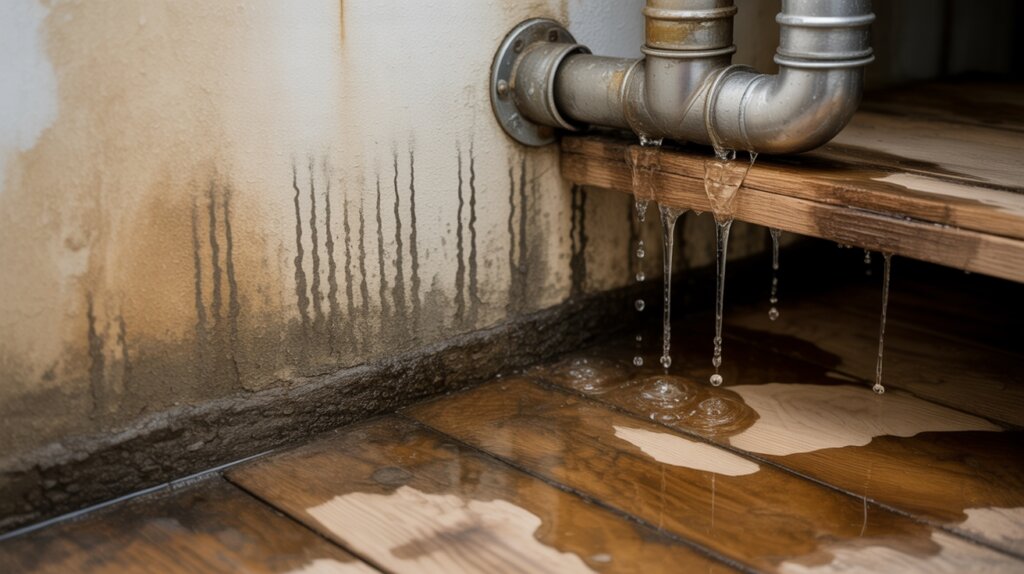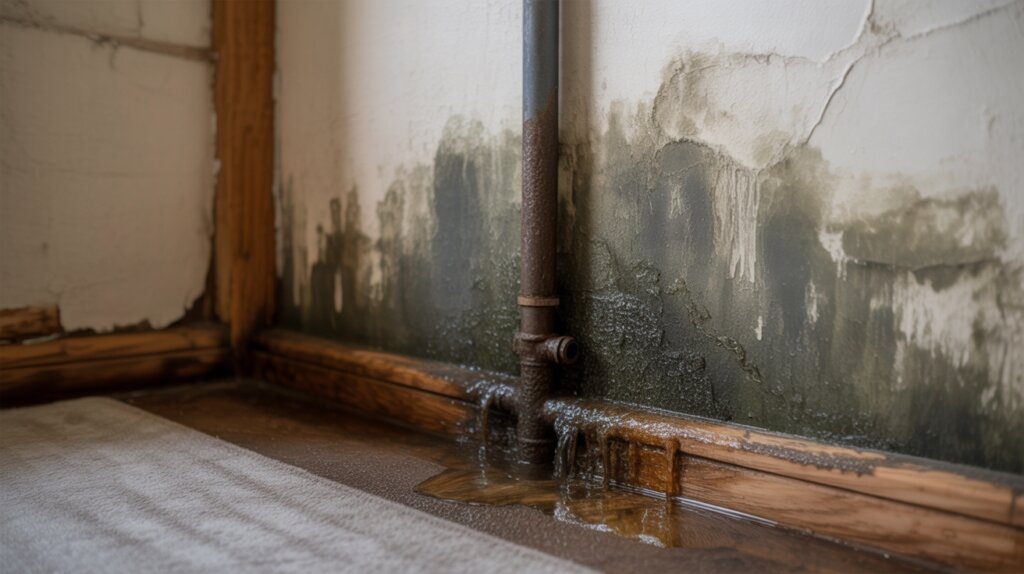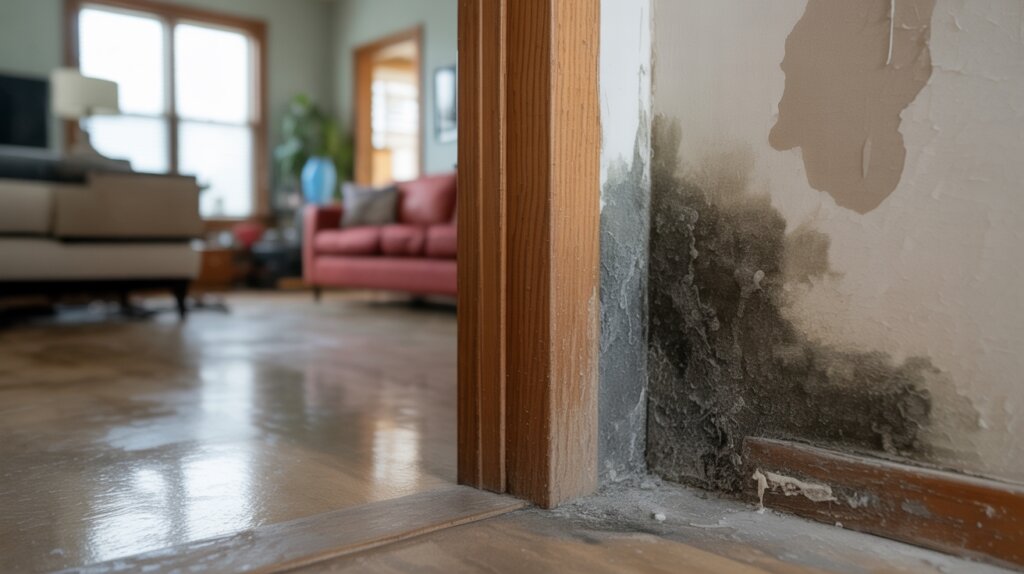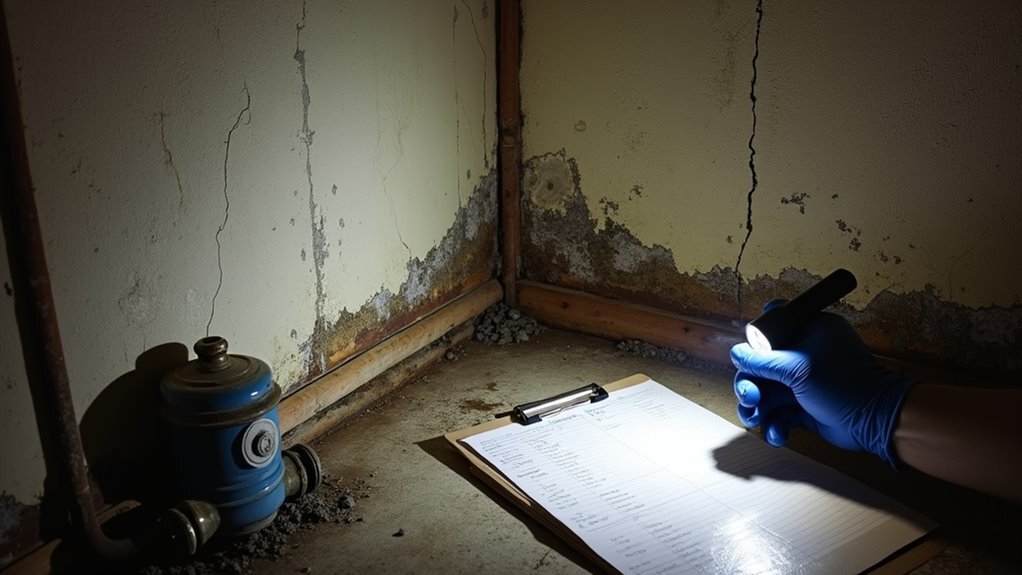Water damage is a major concern when buying or selling a home. Inspectors quickly spot leaks, stains, or musty smells. These warning signs often cause deals to stall or collapse.
Even small leaks can hide bigger problems. Repairs may be expensive and time-consuming. Buyers could lower their offers or walk away completely.
Water damage can reduce your home’s value and make a sale much harder. The good news is you can fix issues before they get worse. Acting early saves money and stress. This blog will guide you through spotting, fixing, and handling water damage during home sales.
Key Takeaways
- Water damage is a red flag in home inspections, often leading to lower appraisals and reduced buyer interest.
- Inspectors look for visible and hidden signs of moisture, which can indicate structural or mold issues requiring costly repairs.
- Unresolved water damage can decrease property value and result in lower offers or requests for seller-funded repairs.
- Sellers are legally required to disclose known water damage; failure to do so risks lawsuits and canceled sales.
- Insurance may not cover gradual water damage, making thorough documentation and regular maintenance essential for successful claims and higher sale value.
Common Sources of Water Damage in Homes

Water damage in homes often comes from hidden or overlooked sources. Plumbing leaks are a common cause, especially behind walls or under sinks. Even small leaks can cause serious problems over time. Cash buyers often look for homes with water damage because they can purchase properties in as-is condition and renovate them themselves.
Roof issues, such as missing shingles or clogged gutters, let water enter the house. This can damage ceilings, insulation, and attics. If you see water stains, you should check your roof right away. HVAC condensation lines and poorly sealed windows can also let water inside. Appliances like water heaters and washing machines may leak without warning. If you inspect these areas regularly, you can prevent costly repairs.
Signs of Water Damage Inspectors Look For
Inspectors look for clear signs of water damage during their checks. They examine ceilings, walls, and floors for stains or bubbling paint. Soft drywall or warped baseboards can also mean moisture problems. Inspectors check for stains, bubbling paint, soft drywall, or warped baseboards—early warning signs of hidden water damage in your home.
Musty odors often suggest hidden mold from damp conditions. Around sinks or toilets, inspectors check for corrosion or recent repairs, which could point to leaks. If they find mineral deposits, there might be a plumbing issue.
Inspectors look for rust or a white powder called efflorescence in basements and crawl spaces. These signs show there may be too much moisture. They use moisture meters or thermal cameras if they suspect hidden water damage. Additionally, proper pricing strategies can help sellers address issues like water damage effectively, making the property more attractive to buyers.
If you see any of these signs, there may be a water problem. Early detection can help prevent bigger repairs later. Conducting a thorough property lien search can be beneficial if water damage results in liens or legal issues related to property ownership. Consider getting a professional inspection to confirm the extent of damage and necessary repairs.
The Role of Water Damage in Home Inspection Reports

When reviewing a home inspection report, you’ll want to pay close attention to any mention of hidden moisture issues, as these can signal underlying structural problems. Unaddressed water damage can significantly diminish property value and complicate resale.
Make sure you understand how inspectors identify these concerns and the potential financial implications for you as a buyer or seller. Be aware that water damage can sometimes be mistaken for or occur alongside termite damage, which can further weaken the structure if not properly treated. Additionally, understanding the importance of a clear title can help ensure that water damage-related liens or claims are properly addressed during the sale process.
Identifying Hidden Moisture Issues
Hidden moisture issues can be hard to spot without proper inspection. Water damage is not always visible on surfaces. Moisture can hide behind walls, under floors, or inside ceilings.
Leaks can come from plumbing, roofs, or exterior walls. Homeowners and buyers should check for damp areas under sinks and around windows. If any leaks are found early, it can prevent mold and damage.
A certified home inspector uses special tools to find hidden moisture. Moisture meters and infrared cameras help locate water that is not visible. Relying on these inspections can save money on future repairs.
If you ignore hidden leaks, they may lead to bigger problems. Mold and structural damage can become costly to fix. Always check for hidden moisture before buying a home.
Impact on Property Value
Water damage lowers a property’s value. Buyers often see water issues as serious problems. They might offer less money or ask for repairs.
Unresolved water damage can raise concerns about the building’s safety and future repair costs. Mold growth is another common worry. Insurance claims for previous damage may also make buyers uneasy.
If insurance payments do not cover all repairs, problems may remain. Sellers should always disclose past claims and completed repairs. Being honest and using professional repairs help keep the sale process smooth.
How Water Damage Impacts Appraised Value
Water damage lowers a home’s appraised value. Appraisers look for problems like stains, warped floors, or foundation issues. These signs show there may be bigger problems that affect the home’s worth.
Appraisers also check if you have fixed water damage and used prevention tools, such as sump pumps or better drainage. If you have not fixed the cause or if your home is in a flood zone without proper insurance, the value may drop more.
Homeowners should keep records of repairs and proof of flood insurance. If you show you have managed risks, the negative impact on value may be smaller. Taking these steps helps prove you care for your property. Additionally, understanding the importance of title insurance can provide further protection against unforeseen issues that may arise during the sale process.
Mold and Mildew Concerns Linked to Water Damage

You need to recognize that water damage creates ideal conditions for mold and mildew, which release spores that compromise indoor air quality and trigger health issues. It’s easy to overlook colonies hidden behind walls or under flooring, leading to unseen structural deterioration. Prioritize thorough inspections to identify and remediate these hazards before they intensify.
Additionally, understanding the step-up in basis can help homeowners or buyers better assess potential financial implications during property transactions. Recognizing the long-term effects of water damage can also motivate prompt action to prevent costly repairs later on.
Health Risks From Spores
Spores from mold and mildew can cause serious health problems if breathed in. These spores often appear after water damage in homes. People may not notice them right away because they are invisible and can spread quickly.
Breathing in mold spores can lead to coughing, sneezing, or trouble breathing. Children, seniors, and those with weak immune systems are most at risk. Allergic reactions and asthma attacks can also happen if exposure continues.
Moist areas in your home give mold and mildew a place to grow. During inspections, professionals may use special tools to find hidden moisture or mold. If you see mold or smell a musty odor, you should act quickly.
Early clean-up and repairs lower health risks and protect your home’s value. Ignoring the problem can make it worse and more costly to fix. Homeowners should always address water damage and mold as soon as possible.
Hidden Structural Damage
Water damage can weaken a home’s structure, even if you cannot see it. Moisture often gets trapped behind walls, under floors, or near the foundation. This hidden water can cause wood to rot and damage support beams.
Over time, you may notice uneven floors or doors that stick. These small changes can mean bigger problems are forming. If structural issues continue, the house can become unsafe and lose value.
Home inspectors use special tools to find hidden water damage. They may use moisture meters or infrared cameras to check for problems. If you smell musty odors or see stains, these can be signs of hidden moisture.
If you fix water problems early, you can protect your home’s strength. Quick action also helps avoid expensive repairs in the future. Always pay attention to warning signs to keep your home safe.
Structural Risks Associated With Moisture Intrusion
Moisture intrusion can cause serious problems for a home’s structure. It speeds up wood rot, damages metal connectors, and weakens foundations. If left untreated, these issues can make your home unsafe. Highlighting potential Understanding the full extent of damage caused by water intrusion can help homeowners and inspectors assess the severity and prioritize repairs effectively.
Water entering the structure may cause floor joists and beams to weaken. Sagging or uneven floors can result if this happens. Steel supports may rust and lose strength, reducing how much weight they can safely hold. Foundation materials can crumble when exposed to moisture. This can lead to shifting or settling of the house.
Wall studs may also get damaged, which could increase the risk of collapse or mold growth. Deceased property If you notice any signs of moisture, you should act quickly. Early repairs can protect your home’s value and keep it safe. Regular inspections help catch problems before they get worse.
Insurance Implications of Water-Related Issues
Homeowner’s insurance handles water issues in specific ways. It usually covers sudden damage, like a burst pipe, but not gradual problems. Flooding and sewer backups need extra insurance or riders. A thorough documentation process can help substantiate your claim, especially if the water damage is linked to foundation issues or structural concerns.
Additionally, insurers often require proof of proper home maintenance to validate claims related to water damage. Policies often exclude damage from slow leaks or poor maintenance. You should read your policy to understand what is not covered.
If you find water damage, document it carefully before making a claim. Insurance companies will check how and when the damage happened. Fast reporting and regular home maintenance can help your claim succeed. Proper preparation may help you get the most from your policy.
Disclosure Requirements for Sellers
As a seller, you’re legally required to disclose any known water damage or related repairs to potential buyers. Failing to comply can trigger costly legal disputes and negatively affect your transaction. Transparent disclosure not only protects you from liability but can also influence your sale price and buyer trust.
Additionally, providing documentation of addressing noticeable issues can demonstrate your commitment to transparency and help facilitate a smoother sale process. Being aware of disclosure requirements ensures you meet legal obligations and maintain buyer confidence throughout the transaction.
Legal Obligations Explained
You must tell buyers about any water damage you know about in your home. This is a legal requirement in most places. If you do not share this information, you could face lawsuits or fines.
Sellers should always be honest and open about water issues. If you are unsure about what to disclose, ask your real estate agent or a lawyer. Keeping clear records and sharing them protects you.
Report all water leaks or flooding, no matter when they happened. Give buyers any paperwork about repairs or insurance claims. You should answer all buyer or inspector questions truthfully.
Each state has its own rules for disclosure forms. Make sure you know and follow these rules before selling. If you meet these legal obligations, you reduce your risk of problems later.
Impact on Sale Price
Disclosing water damage can change your sale price. Buyers often lower their offers to cover repair costs. Hiding damage may lead to lost trust or last-minute deal changes.
Full disclosure builds trust with buyers and can support fair offers. If you hide water damage, buyers may back out or offer less. Remediated damage gives buyers more confidence and may help keep the price higher.
Ongoing water issues usually lower the sale price. Not disclosing damage can lead to legal trouble and big price drops. Always be honest about water damage to protect your sale price.
Negotiating Repairs After Water Damage Is Found
If a home inspection reveals water damage, you should focus on repair negotiations right away. Start by using the inspection report to show what needs fixing. Make sure you understand the costs, risks, and your position as a buyer or seller.
Check if the seller has filed an insurance claim for the damage. Insurance claims can affect how repairs are handled and what options you have. Always ask for proof of any claims or payouts.
Insist that licensed contractors handle all repairs. Ask for warranties on the work to protect yourself in the future. If possible, request detailed invoices for any repairs done.
Get several repair estimates from qualified professionals. This helps you understand the real cost and gives you more bargaining power. If the seller already made repairs, include a post-repair inspection in your agreement to confirm the work is done well.
Address both the current damage and ways to prevent future water issues. Incorporating a professional assessment can help identify underlying causes and prevent recurrence. If you cover these points, you can negotiate better and avoid surprises later.
Buyer Red Flags: When to Walk Away
Extensive water damage is a strong reason to walk away from buying a home. Properties in flood zones face higher risks and insurance costs. If you see signs of water issues, it is often safer not to move forward.
Plumbing leaks can show up as stains, warped floors, or musty smells, which suggest bigger problems. Sellers should provide paperwork for all repairs or flood prevention work. Missing or unclear documents should make you cautious.
Hidden mold, damaged walls, or foundation cracks are serious warning signs. These issues may point to larger, hidden problems. If your home inspector raises concerns, you should consider backing out of the deal.
The Cost of Remediation and Restoration
Remediation and restoration after water damage can be expensive. Costs often rise quickly beyond what you might first expect. You need a clear estimate to avoid financial surprises.
Labor costs change depending on your location and the skills required. Specialized machines, like dehumidifiers, also add to your expenses. If moisture is not removed quickly, mold cleanup can become very costly.
Structural repairs, such as fixing drywall or floors, may reveal extra hidden costs. You should always ask certified experts for a full assessment. Accurate estimates help you plan for the total cost of repairs.
Preventative Measures for Homeowners
Preventative measures help homeowners protect their homes from damage and loss. Regular maintenance can prevent costly repairs in the future. Homeowners should take action before problems occur.
Inspect roofs and gutters twice a year. If you find damage, fix it right away to prevent leaks. Clean gutters to avoid water buildup.
Check windows and doors for gaps. Sealing these gaps can stop drafts and moisture from entering. If you notice cracks, use caulk or weatherstripping.
Test smoke alarms and carbon monoxide detectors monthly. Replace their batteries at least once a year. If alarms do not work, replace them immediately.
Trim trees and bushes near your home. Overgrown branches can damage roofs and windows during storms. If trees look unhealthy, call a professional for inspection.
Store valuable items in a safe place. If possible, keep important documents in waterproof containers. This helps protect belongings from fire or water damage.
Legal Consequences of Concealed Water Damage
Concealed water damage can lead to legal problems for homeowners. Hiding water issues or failing to tell buyers is risky. If buyers find out, they may sue, ask for repairs, or cancel the sale.
Courts can order you to pay for damages or repairs. Fraud or breach of contract claims may result from non-disclosure. Inspectors might also find hidden problems, causing the sale to fall through.
If you do not disclose water damage, your reputation as a seller can suffer. Future property sales could become harder. Always be honest about water issues before listing a home.
Working With Real Estate Agents on Water Damage Issues
Real estate agents are important when dealing with water damage issues. They have experience with property disclosures and local laws. If you involve them early, you can avoid mistakes and confusion.
Agents can clear up common myths about water damage. They explain the facts to both buyers and sellers. This helps everyone understand what water damage really means for the property.
Agents can suggest qualified inspectors if an inspection is needed. These inspectors have the right training to make sure nothing is missed. If you rely on their recommendations, you reduce the risk of incomplete assessments.
Proper documentation and clear disclosure are easier with an agent’s help. Agents can guide you on how to record repairs and past problems. If you need to negotiate, they also help you find strong points for your case.
Agents protect your interests during the transaction. They can give buyers more confidence in the property. If you want to avoid legal issues, working with an agent is a smart choice.
Conclusion
If you notice water damage in your home, it could affect your inspection and sale. Home buyers and inspectors often see even small stains as serious issues. If you do not address these problems, you could lose value or face legal trouble.
If you want to sell your house quickly, we can help. Greg Buys Houses purchases homes for cash, even with water damage. We make the selling process simple and stress-free for homeowners.
If you are ready to move on, contact us today. We can give you a fair, no-obligation cash offer. Let Greg Buys Houses take care of your home and give you peace of mind.

